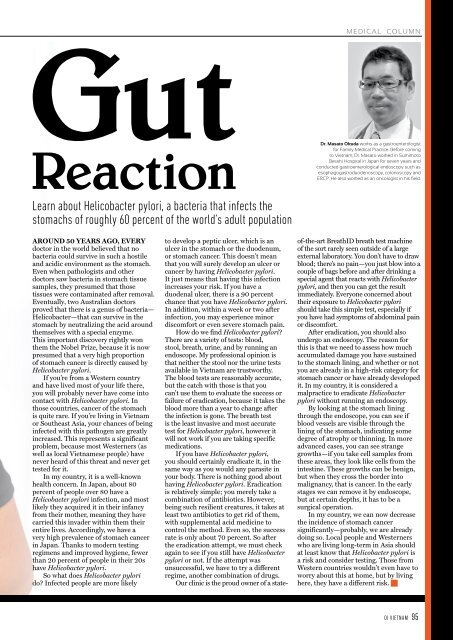Oi Magazine reviews - Aura & Co. Infrared Sauna Studio,Thao Dien... "Heavenly Heat"
Create successful ePaper yourself
Turn your PDF publications into a flip-book with our unique Google optimized e-Paper software.
MEDICAL COLUMN<br />
Dr. Masato Okuda works as a gastroenterologist<br />
for Family Medical Practice. Before coming<br />
to Vietnam, Dr. Masato worked in Sumimoto<br />
Besshi Hospital in Japan for seven years and<br />
conducted gastroenterological endoscopy such as<br />
esophagogastroduodenoscopy, colonoscopy and<br />
ERCP. He also worked as an oncologist in his field.<br />
Learn about Helicobacter pylori, a bacteria that infects the<br />
stomachs of roughly 60 percent of the world’s adult population<br />
AROUND 50 YEARS AGO, EVERY<br />
doctor in the world believed that no<br />
bacteria could survive in such a hostile<br />
and acidic environment as the stomach.<br />
Even when pathologists and other<br />
doctors saw bacteria in stomach tissue<br />
samples, they presumed that those<br />
tissues were contaminated after removal.<br />
Eventually, two Australian doctors<br />
proved that there is a genus of bacteria—<br />
Helicobacter—that can survive in the<br />
stomach by neutralizing the acid around<br />
themselves with a special enzyme.<br />
This important discovery rightly won<br />
them the Nobel Prize, because it is now<br />
presumed that a very high proportion<br />
of stomach cancer is directly caused by<br />
Helicobacter pylori.<br />
If you’re from a Western country<br />
and have lived most of your life there,<br />
you will probably never have come into<br />
contact with Helicobacter pylori. In<br />
those countries, cancer of the stomach<br />
is quite rare. If you’re living in Vietnam<br />
or Southeast Asia, your chances of being<br />
infected with this pathogen are greatly<br />
increased. This represents a significant<br />
problem, because most Westerners (as<br />
well as local Vietnamese people) have<br />
never heard of this threat and never get<br />
tested for it.<br />
In my country, it is a well-known<br />
health concern. In Japan, about 80<br />
percent of people over 80 have a<br />
Helicobacter pylori infection, and most<br />
likely they acquired it in their infancy<br />
from their mother, meaning they have<br />
carried this invader within them their<br />
entire lives. Accordingly, we have a<br />
very high prevalence of stomach cancer<br />
in Japan. Thanks to modern testing<br />
regimens and improved hygiene, fewer<br />
than 20 percent of people in their 20s<br />
have Helicobacter pylori.<br />
So what does Helicobacter pylori<br />
do? Infected people are more likely<br />
to develop a peptic ulcer, which is an<br />
ulcer in the stomach or the duodenum,<br />
or stomach cancer. This doesn’t mean<br />
that you will surely develop an ulcer or<br />
cancer by having Helicobacter pylori.<br />
It just means that having this infection<br />
increases your risk. If you have a<br />
duodenal ulcer, there is a 90 percent<br />
chance that you have Helicobacter pylori.<br />
In addition, within a week or two after<br />
infection, you may experience minor<br />
discomfort or even severe stomach pain.<br />
How do we find Helicobacter pylori?<br />
There are a variety of tests: blood,<br />
stool, breath, urine, and by running an<br />
endoscope. My professional opinion is<br />
that neither the stool nor the urine tests<br />
available in Vietnam are trustworthy.<br />
The blood tests are reasonably accurate,<br />
but the catch with those is that you<br />
can’t use them to evaluate the success or<br />
failure of eradication, because it takes the<br />
blood more than a year to change after<br />
the infection is gone. The breath test<br />
is the least invasive and most accurate<br />
test for Helicobacter pylori, however it<br />
will not work if you are taking specific<br />
medications.<br />
If you have Helicobacter pylori,<br />
you should certainly eradicate it, in the<br />
same way as you would any parasite in<br />
your body. There is nothing good about<br />
having Helicobacter pylori. Eradication<br />
is relatively simple; you merely take a<br />
combination of antibiotics. However,<br />
being such resilient creatures, it takes at<br />
least two antibiotics to get rid of them,<br />
with supplemental acid medicine to<br />
control the method. Even so, the success<br />
rate is only about 70 percent. So after<br />
the eradication attempt, we must check<br />
again to see if you still have Helicobacter<br />
pylori or not. If the attempt was<br />
unsuccessful, we have to try a different<br />
regime, another combination of drugs.<br />
Our clinic is the proud owner of a stateof-the-art<br />
BreathID breath test machine<br />
of the sort rarely seen outside of a large<br />
external laboratory. You don’t have to draw<br />
blood; there’s no pain—you just blow into a<br />
couple of bags before and after drinking a<br />
special agent that reacts with Helicobacter<br />
pylori, and then you can get the result<br />
immediately. Everyone concerned about<br />
their exposure to Helicobacter pylori<br />
should take this simple test, especially if<br />
you have had symptoms of abdominal pain<br />
or discomfort.<br />
After eradication, you should also<br />
undergo an endoscopy. The reason for<br />
this is that we need to assess how much<br />
accumulated damage you have sustained<br />
to the stomach lining, and whether or not<br />
you are already in a high-risk category for<br />
stomach cancer or have already developed<br />
it. In my country, it is considered a<br />
malpractice to eradicate Helicobacter<br />
pylori without running an endoscopy.<br />
By looking at the stomach lining<br />
through the endoscope, you can see if<br />
blood vessels are visible through the<br />
lining of the stomach, indicating some<br />
degree of atrophy or thinning. In more<br />
advanced cases, you can see strange<br />
growths—if you take cell samples from<br />
these areas, they look like cells from the<br />
intestine. These growths can be benign,<br />
but when they cross the border into<br />
malignancy, that is cancer. In the early<br />
stages we can remove it by endoscope,<br />
but at certain depths, it has to be a<br />
surgical operation.<br />
In my country, we can now decrease<br />
the incidence of stomach cancer<br />
significantly—probably, we are already<br />
doing so. Local people and Westerners<br />
who are living long-term in Asia should<br />
at least know that Helicobacter pylori is<br />
a risk and consider testing. Those from<br />
Western countries wouldn’t even have to<br />
worry about this at home, but by living<br />
here, they have a different risk. <br />
OI VIETNAM<br />
95





